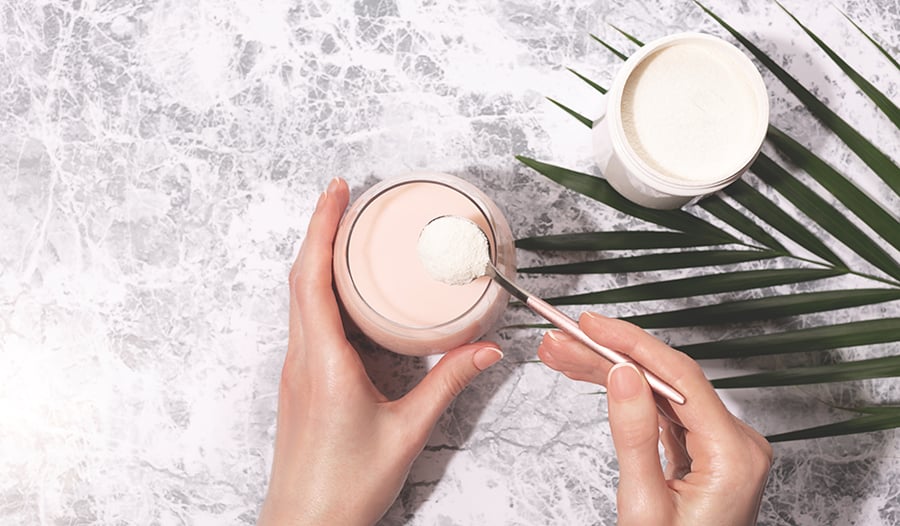Κολλαγόνο: Τύποι, Οφέλη, + Συμβουλές

Τι είναι το κολλαγόνο;
Το κολλαγόνο είναι η πιο άφθονη μορφή πρωτεΐνης στο σώμα σας. Είναι το κύριο δομικό στοιχείο για τα οστά, το δέρμα, τους μύες, τους τένοντες, τους συνδέσμους και άλλους συνδετικούς ιστούς παρέχοντας δύναμη και υποστήριξη σε όλο το σώμα. Με μια υγιεινή διατροφή, το σώμα σας μπορεί να δημιουργήσει κολλαγόνο από αμινοξέα που βρίσκονται στις πρωτεΐνες μαζί με βιταμίνη C, ψευδάργυρο, χαλκό και μαγγάνιο. Ωστόσο, καθώς γερνάμε, το υπάρχον κολλαγόνο διασπάται γρηγορότερα από ό, τι μπορεί να ξαναχτιστεί από το σώμα.
Ποιοι είναι οι διαφορετικοί τύποι κολλαγόνου;
Με 28 διαφορετικούς τύπους κολλαγόνου που έχουν εντοπιστεί, μπορεί να είναι συντριπτικό να καθοριστεί ποιο συμπλήρωμα πρέπει να πάρετε. Ας δούμε τα τρία πρώτα.
- Το κολλαγόνο τύπου Ι αποτελεί το 90% του κολλαγόνου και βρίσκεται από το κεφάλι μέχρι τα δάχτυλα στο σώμα σας. Έτσι, όταν σκέφτεστε οποιοδήποτε συμπλήρωμα, το κολλαγόνο τύπου Ι θα πρέπει να είναι μέρος της φόρμουλας για περισσότερη συνολική υποστήριξη.
- Το κολλαγόνο τύπου II βρίσκεται συχνά σε συμπληρώματα που υποστηρίζουν την υγεία των αρθρώσεων καθώς βρίσκεται κυρίως στον χόνδρο.
- Το κολλαγόνο τύπου ΙΙΙ βρίσκεται κυρίως στους μύες, τις αρτηρίες και τα όργανα.
- Οι άλλοι 25 τύποι κολλαγόνου είναι σημαντικοί για άλλες περιοχές του σώματος, αλλά απαιτούνται μόνο σε μικρότερες ποσότητες. Όταν το σκεφτείτε, το 90% του κολλαγόνου σας είναι τύπου Ι, πράγμα που σημαίνει ότι το άλλο 10% κατανέμεται μεταξύ των άλλων 27 τύπων.
Πώς μπορείτε να αυξήσετε το κολλαγόνο στο σώμα σας;
Φυσικά, μια ισορροπημένη διατροφή που περιλαμβάνει πρωτεΐνες υψηλής ποιότητας (που παρέχουν τα δομικά στοιχεία για το κολλαγόνο), η άφθονη άσκηση και ο ύπνος, το να μην καπνίζετε, να φοράτε αντηλιακό (για να προστατεύσετε το κολλαγόνο του δέρματός σας από τη διάσπαση από τις ακτίνες UVB/UVA) είναι όλα μέρος της υποστήριξης της παραγωγής κολλαγόνου στο σώμα.
Επιπλέον, υπάρχουν διαθέσιμα συμπληρώματα κολλαγόνου. Ωστόσο, είναι σημαντικό να σημειωθεί ότι αυτά τα συμπληρώματα πρέπει να έχουν κολλαγόνο σε μορφή «πεπτιδίου», που σημαίνει ότι το μόριο κολλαγόνου έχει διασπαστεί σε μικρότερη μορφή. Ολόκληρη η μορφή του μορίου κολλαγόνου δεν μπορεί να απορροφηθεί.
Τι να ψάξετε στα συστατικά συμπληρώματος κολλαγόνου;
Με τις συντριπτικές επιλογές στην κατηγορία συμπληρωμάτων κολλαγόνου, είναι σημαντικό να γνωρίζετε τι πρέπει να αναζητήσετε σχετικά με τα συστατικά.
Αναζητήστε ένα συμπλήρωμα κολλαγόνου που περιλαμβάνει κλινικά ερευνημένα συστατικά όπως βιταμίνη C, βιταμίνη Ακαι βιοτίνη για βέλτιστα αποτελέσματα. Η βιταμίνη C μπορεί να βοηθήσει στην προστασία του δέρματος και βοηθά στο σχηματισμό κολλαγόνου στο στρώμα του δέρματος και η βιταμίνη Α βοηθά στην ανανέωση του δέρματος στο στρώμα της επιδερμίδας. Η βιοτίνη υποστηρίζει το υγιές δέρμα, τα μαλλιά και τα νύχια.
Παραπομπές:
- https://my.clevelandclinic.org/health/articles/23089-collagen
- https://nutritionsource.hsph.harvard.edu/collagen/
- Χαντ, Ν. Κ. (2010). Μια μήτρα αλγινικής υδρογέλης για την τοπική χορήγηση μιας συνκαλλιέργειας ινοβλαστών/κερατινοκυττάρων για την επιτάχυνση της επούλωσης πληγών. https://core.ac.uk/download/75539.pdf
ΑΠΟΠΟΙΗΣΗ ΕΥΘΥΝΗΣ:Αυτό το Κέντρο Ευεξίας δεν προορίζεται να παρέχει διάγνωση...













































































 Πίνακας περιεχομένων
Πίνακας περιεχομένων














